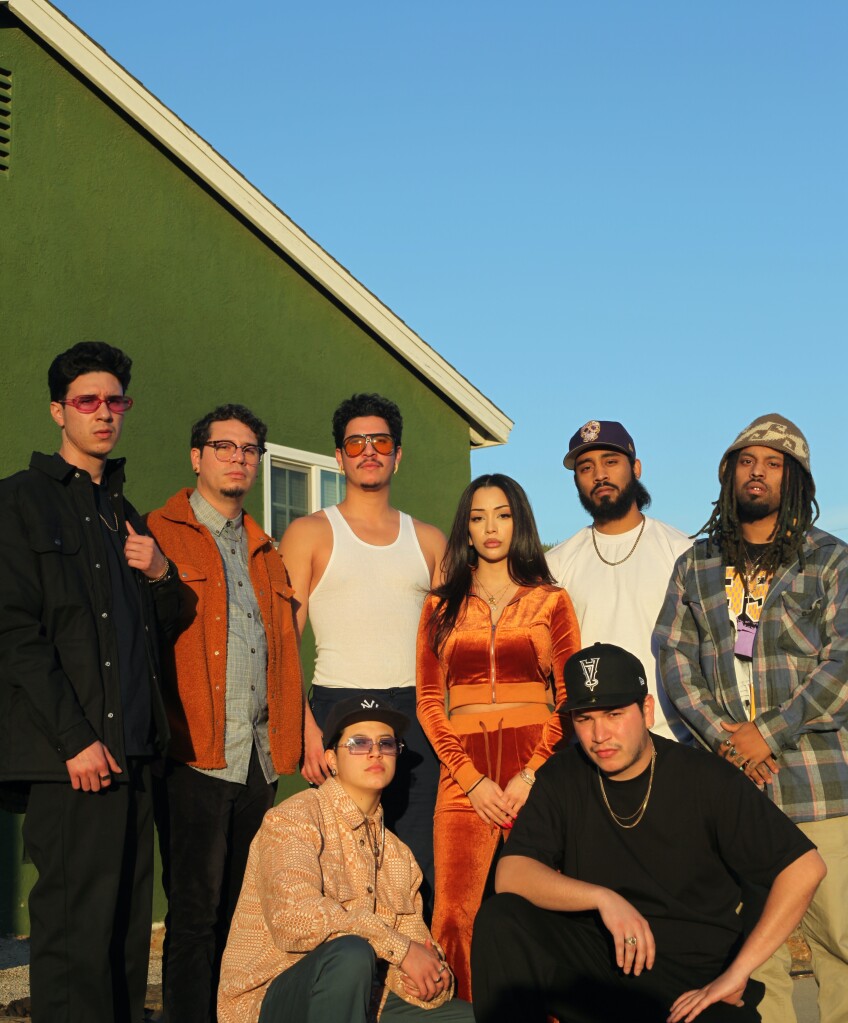How Anaheim-Born Hip Hop Group Weapons of Mass Creation Started the Revolution at Home

Packed in the small bedroom-turned-studio of their childhood home, Weapons of Mass Creation gather in a tight circle. As each member takes a seat on worn stools and a low couch, laughter and a deep sense of camaraderie grows.
"We've been looking for a studio that can fit all of us," says guitarist Luis Franco, stretching his arms as if embracing the room.
Born and raised in Anaheim, WOMC is a form of resistance among the mass-produced world of music. Their collective talent oozes originality and intent; their lyrics amplify the Anaheim communities they grew up in and tell stories of police brutality, generational trauma and misogyny. And when woven into the soulful caress of funk, hip hop and cumbia rhythms, they offer a sound that is both a rarity and infectious. The kind of sound that piques the ears of the industry and recognition as Best Hip Hop Act of 2019 by OC Weekly (the legendary Orange County newspaper that ran for 24 years). Yet the siblings remain loyal to not only their music but each other, a dedication that has kept the octet intact throughout the years.

From the defiant, textured beats produced by Moses (or Moe Budda) and Joseph (or Crudo) Franco to the liquid tones of saxophonist Silas Franco, the band covers every element they require to keep their work pure and intentional. This self-sustaining model has allowed WOMC to navigate through the industry as one like-minded unit, maintaining their integrity in each hazy synth and uncompromising verse. However, this steadfast loyalty comes with setbacks. "That's why it's taken us longer to get through certain doors," says Crudo. "Because we have said no to people that thought they would get a yes from us right away."
Eight members strong, today WOMC comprises the Franco siblings—Luis, Jacob, Crudo, Julia (or Joules), Moe Budda and Silas Franco — and the Quiñonez brothers—Josh (or Soli) and Enrique Quiñonez (or EQ). Although they all attended the same high school, a chance meeting between Soli and Joules at the courtyard of Fullerton College brought the two families together. After joining the band, Soli's younger brother, EQ, who was already best friends with Moe Budda, followed.

"When we started working and writing there was a certain synergy. I had been in another whole other group but I had never felt that," says Soli. "Everyone has their own different artistry but we're able to encapsulate that into one form."
While the nascent stages of the band performed under the name Franco Funktion, by the time Soli and EQ joined, WOMC had formed. In recent years, the band has shifted, stretching and bending into new soundscapes and modes of storytelling.
Still, their music continues to embody both their individual and shared experiences— packing potent sentiments that resonate with their Orange County community and beyond. "We all deal with very similar trauma," says Joules. "A lot of what we write is from a very intimate place."
Growing up, the Franco siblings bore the heavy burden of a staunch patriarchal and religious household and challenges surrounding substance abuse. College before marriage was out of the question for the Franco daughters, including Joules. So when their eldest sister applied to college without their parent's knowledge, was accepted, and told them they could not stop her, their sister's decision radicalized the Francos—instilling the idea that "the revolution starts at home."

"She broke the mold for all of us," remembers Joules. "She was the person who really liberated our family into challenging patriarchal expectations of how to live your life not only as a woman but also as a man."
The Quiñonez brothers shared the collective experience of resisting and ending cycles of trauma. Soli, who spent a large part of his childhood in the school-to-prison pipeline, says, "All of us here have a very politicized view of the world and use music in a form of activism."
In 2016, Anaheim police gunned down and murdered 22-year-old Gustavo Najera. In tribute to their friend, who they knew as Asmek, WOMC wrote "Rest In Paint (Asmek)." The song tells the life of a man who fell victim to a broken system, mourning, "Another young brown man suffered the same fate. Another face on the news reel. Close to home it's too real." The song laid the early foundations of WOMC's lyrical creed and bond to their city.
That following year, the band released "Hard to Admit." Set against slow-building layers of aching guitar strings and glassy tempos, Joules recounts, "I'm out here thinking it's to love myself a hug and a kiss. I never thought that it meant protect myself when a brother gets pissed." The track was featured on their video debut in Santa Ana, CA, and triggered an outpour of accolades on social media. Here, WOMC also traverses into uncharted territory, marking an elevation in vulnerability and a decisive leap into more robust instrumentals.
Their latest work marks a revelation and collective exhalation of change for WOMC. The candidly addictive love songs "All I Do" (released in 2021) and "Miel" (featured on their 2019 album) break from their historical erudition, and bask in the simple yet powerful idea of love.
And then there are tracks such as "Neighborhood Watch," a sonic and lyrical odyssey reckoning with self-doubt and self-love that flexes the band's newfound horizon. In the first verse, Soli reflects, "Cause I've been asking for attention but that shit don't last. And I've been lacking in affection and my shit gon crash." The lyrics drip into a cascade of emotional turbulence and eventually find their way to Jacob's steady drop, "It's f*cked up when I need 40 ounces just to focus. Or to cope with the POTUS. Tell that motherf*cker give us what he owe us." The song echoes the triumphant and cohesive purpose of the album, "Labor of Love" — bidding insight into WOMC's future ambitions.
Another young brown man suffered the same fate. Another face on the news reel. Close to home it's too real."Rest in Paint (Asmek)" by Weapons of Mass Creation
In a time where much of music riding radio waves consists of short, hyper-calculated songs solely engineered for digestibility, WOMC feels both brazen and unapologetic. It is clear that they are not here to be changed, but to cultivate change.
"A lot of people are looking from the outside-in," says Joules. "People can't f*ck with us. Nothing can break us."
Itching to hear more from Weapons of Mass Creation? Listen to the writer's curated song list below.






